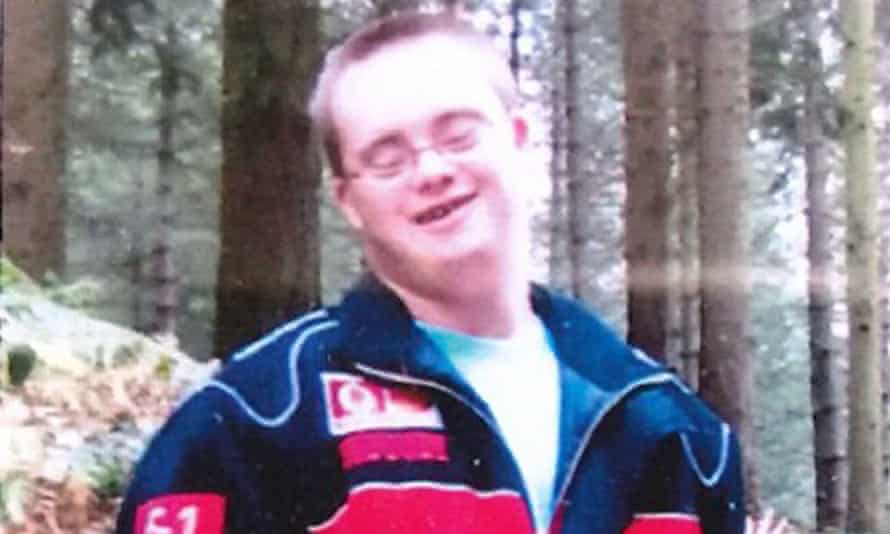Report calls for greater regulation at facilities for those with learning disabilities after three deaths at Norfolk site
 |
| Ben King, 32, who had Down’s syndrome, died at Cawston Park hospital near Aylsham, Norfolk last year after going into cardiac arrest. Photograph: Family Handout/PA |
Private hospitals receiving millions to care for adults with learning disabilities and autism should face greater regulation, a report has warned, as a mother whose son was among three people to die at a facility in Norfolk said his death was a “scandal”.
The failures at Cawston Park Hospital near Aylsham should prompt a review to prevent further “lethal outcomes” at similar sites, the report, commissioned by Norfolk Safeguarding Adults Board (NSAB), concluded. It suggested that such facilities should “cease to receive public money”.
Ben King, 32, who had Down’s syndrome, died at Cawston Park hospital near Aylsham, Norfolk, last year after going into cardiac arrest.
The report’s author, Margaret Flynn, said that King had put on weight at Cawston Park, exacerbating his sleeping problems, and the day before he died his mother had pleaded with clinicians to get an ambulance for him.
No ambulance was sent and CCTV images shared with his inquest show he was subjected to rough handling and was slapped, Flynn told a virtual press conference.
The hospital closed earlier this year.
King’s mother, Gina Egmore, said his death was a “scandal”, adding: “If you ill-treat an animal, you get put in prison. “But people ill-treated my son and they’re still free.”
An independent report into the deaths of King, Nicholas Briant, 33, and 36-year-old Joanna Bailey, who all died at Cawston Park, said their relatives described “indifferent and harmful hospital practices”.
The report, published on Thursday, makes reference to “excessive use of restraint and seclusion by unqualified staff” and a “high tolerance of inactivity”. “Unless this hospital and similar units cease to receive public money, such lethal outcomes will persist,” the report said.
It added that “not a great deal has changed” since the abuse scandal at the former Winterbourne View private hospital near Bristol, which was exposed in an undercover BBC Panorama documentary in 2011.
The report into the deaths at Cawston Park has made 13 recommendations to a series of agencies including the Law Commission, suggesting a review of the law around private companies caring for adults with learning disabilities and autism.
“Given the clear public interest in ensuring the wellbeing and safety of patients, and the public sponsorship involved, the Law Commission may wish to consider whether corporate responsibility should be based on corporate conduct, in addition to that of individuals, for example,” the report said.
Flynn, who was commissioned by NSAB, said her report highlighted “failures of governance, commissioning, oversight, planning for individuals and professional practice”.
She said the three deceased “all had aspirations”. “They wanted to be near their families, to have friends and jobs or things to do each day,” she said.
“Their lives at Cawston Park hospital were characterised by unhealthy lifestyles of long-term under-occupation and were not shaped by their goals or interests. The distress of their parents sets an agenda that cannot be ignored.”
An inquest into King’s death heard he had been allowed to gain weight, there was a failure to diagnose the breathing condition obesity hypoventilation syndrome, and inadequate consideration was given to the use of the sedative promethazine.
Briant, who had learning disabilities, died at the hospital in 2018 after swallowing a piece of a plastic cup. His inquest heard he had a history of swallowing objects.
Bailey, who also had learning disabilities, died at the hospital in 2018. The charity Inquest said she died of sudden unexpected death in epilepsy and was not checked for two hours despite 30-minute checks being in her care plan.
Cawston Park was placed into special measures by the Care Quality Commission in 2019 and was closed by its owners, the Jeesal Group, earlier this year, NSAB said.
Joan Maughan, chair of NSAB, said: “This is not the first tragedy of its kind and, unless things change dramatically, it will not be the last. There will always be occasions when some people with learning disabilities and/or autism require specialist support for their very complex needs.
“This calls for a determined and robust commitment from all health, social care, housing and other agencies, at both a national and local level, to develop bespoke services matched to the individual, services that ensure safety, respect, care for their physical and mental health wellbeing, stimulating activities, and plans for a meaningful life in the future.”
A Norfolk police spokesperson said: “The circumstances surrounding Joanna’s death were fully investigated and a case was submitted to the Crown Prosecution Service against several staff members for the offence of a care worker wilfully neglecting an individual.
“However, due to insufficient evidence concerning Joanna’s time of death, it was not possible to proceed with the case because it could not be established whether Joanna was still alive when staff failed to provide CPR.
“The investigation into Ben’s treatment is ongoing and a number of inquiries have been carried out in an attempt to trace the suspect who is wanted by police.”
PA Media contributed to this report

No comments:
Post a Comment